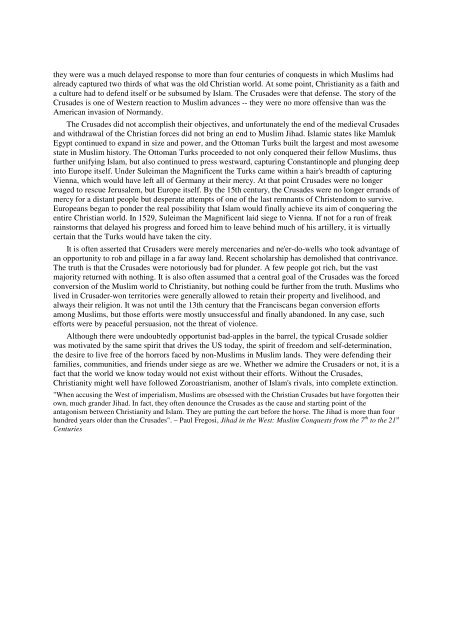A Critical Analysis of 'Real Islam'. Its People ... - Bukti dan Saksi
A Critical Analysis of 'Real Islam'. Its People ... - Bukti dan Saksi
A Critical Analysis of 'Real Islam'. Its People ... - Bukti dan Saksi
You also want an ePaper? Increase the reach of your titles
YUMPU automatically turns print PDFs into web optimized ePapers that Google loves.
they were was a much delayed response to more than four centuries <strong>of</strong> conquests in which Muslims had<br />
already captured two thirds <strong>of</strong> what was the old Christian world. At some point, Christianity as a faith and<br />
a culture had to defend itself or be subsumed by Islam. The Crusades were that defense. The story <strong>of</strong> the<br />
Crusades is one <strong>of</strong> Western reaction to Muslim advances -- they were no more <strong>of</strong>fensive than was the<br />
American invasion <strong>of</strong> Normandy.<br />
The Crusades did not accomplish their objectives, and unfortunately the end <strong>of</strong> the medieval Crusades<br />
and withdrawal <strong>of</strong> the Christian forces did not bring an end to Muslim Jihad. Islamic states like Mamluk<br />
Egypt continued to expand in size and power, and the Ottoman Turks built the largest and most awesome<br />
state in Muslim history. The Ottoman Turks proceeded to not only conquered their fellow Muslims, thus<br />
further unifying Islam, but also continued to press westward, capturing Constantinople and plunging deep<br />
into Europe itself. Under Suleiman the Magnificent the Turks came within a hair's breadth <strong>of</strong> capturing<br />
Vienna, which would have left all <strong>of</strong> Germany at their mercy. At that point Crusades were no longer<br />
waged to rescue Jerusalem, but Europe itself. By the 15th century, the Crusades were no longer errands <strong>of</strong><br />
mercy for a distant people but desperate attempts <strong>of</strong> one <strong>of</strong> the last remnants <strong>of</strong> Christendom to survive.<br />
Europeans began to ponder the real possibility that Islam would finally achieve its aim <strong>of</strong> conquering the<br />
entire Christian world. In 1529, Suleiman the Magnificent laid siege to Vienna. If not for a run <strong>of</strong> freak<br />
rainstorms that delayed his progress and forced him to leave behind much <strong>of</strong> his artillery, it is virtually<br />
certain that the Turks would have taken the city.<br />
It is <strong>of</strong>ten asserted that Crusaders were merely mercenaries and ne'er-do-wells who took advantage <strong>of</strong><br />
an opportunity to rob and pillage in a far away land. Recent scholarship has demolished that contrivance.<br />
The truth is that the Crusades were notoriously bad for plunder. A few people got rich, but the vast<br />
majority returned with nothing. It is also <strong>of</strong>ten assumed that a central goal <strong>of</strong> the Crusades was the forced<br />
conversion <strong>of</strong> the Muslim world to Christianity, but nothing could be further from the truth. Muslims who<br />
lived in Crusader-won territories were generally allowed to retain their property and livelihood, and<br />
always their religion. It was not until the 13th century that the Franciscans began conversion efforts<br />
among Muslims, but those efforts were mostly unsuccessful and finally abandoned. In any case, such<br />
efforts were by peaceful persuasion, not the threat <strong>of</strong> violence.<br />
Although there were undoubtedly opportunist bad-apples in the barrel, the typical Crusade soldier<br />
was motivated by the same spirit that drives the US today, the spirit <strong>of</strong> freedom and self-determination,<br />
the desire to live free <strong>of</strong> the horrors faced by non-Muslims in Muslim lands. They were defending their<br />
families, communities, and friends under siege as are we. Whether we admire the Crusaders or not, it is a<br />
fact that the world we know today would not exist without their efforts. Without the Crusades,<br />
Christianity might well have followed Zoroastrianism, another <strong>of</strong> <strong>Islam'</strong>s rivals, into complete extinction.<br />
"When accusing the West <strong>of</strong> imperialism, Muslims are obsessed with the Christian Crusades but have forgotten their<br />
own, much grander Jihad. In fact, they <strong>of</strong>ten denounce the Crusades as the cause and starting point <strong>of</strong> the<br />
antagonism between Christianity and Islam. They are putting the cart before the horse. The Jihad is more than four<br />
hundred years older than the Crusades". – Paul Fregosi, Jihad in the West: Muslim Conquests from the 7 th to the 21 st<br />
Centuries





